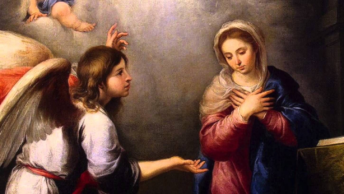
St. Robert Bellarmine was a cardinal who lived at the beginning of the 17th century; he was a man of immense learning and intelligence, but also very humble and gentle. He was involved in many of the religious controversies of the day, but—unlike many religious leaders among both Catholics and Protestants—he was always kind and respectful in opposing and correcting the errors of his opponents. An example of this is to be found in his defense of the Catholic teaching on the Eucharist. Many Protestants rejected the Catholic teaching that Holy Communion truly is the Body and Blood of Christ, and instead claimed that it’s merely a symbol and that Our Lord’s words in the Gospel aren’t to be taken literally. Instead of denouncing or condemning this mistaken opinion, St. Robert Bellarmine merely corrected it with a very simple and easily- understood illustration. Imagine, he said, a wealthy man who announced that in his will he was leaving his house to his son John; would anyone understand the man’s words to mean, “I leave to my son John, not my home itself, but a nice painted picture of it”? Or what if a royal prince promised you 100 gold coins, and—in fulfillment of his words—sent you not the coins themselves, but a beautiful drawing of them? Would you think that the promise had been kept, or would you feel cheated? (Rengers, The 33 Doctors of the Church, p. 495). In the same way, St. Robert claims, Jesus would not have spoken so strongly about the need to eat His Body and drink His Blood, and then provide us only with an image or symbol of the actual reality. No, God’s word can be trusted, and His generosity can be relied upon—and so we, as His children, must logically and confidently believe in the reality of the Eucharist. In this sacrament we truly receive the Body and Blood of Christ, not just a symbol of it, and our response to this gift must demonstrate our belief and express our gratitude.
God doesn’t play games with us, especially when it comes to questions of salvation and eternal life. The Book of Proverbs speaks of wisdom personified, an expression of divine love and truth, offered to all who will accept it. Wisdom calls out to us, “Forsake foolishness that you may live; advance in the way of understanding.” The ultimate foolishness is to doubt God’s word; true understanding can only occur when we trust what God has revealed to us. Wisdom’s invitation to eat of her food and drink of her wine is a foreshadowing of the Eucharist, and as St. Paul tells us in the Letter to the Ephesians, we must make the most of the present opportunity. Not all Christians believe in the Eucharist, and not all Catholics come to Mass each weekend; instead of wasting God’s gifts in this way, we are called to come to the Lord’s table with joyful and grateful hearts, for Jesus is offering us the gift of eternal life. Our Lord makes it very clear in the sixth chapter of John’s Gospel that His words are not to be understood in a symbolic or sentimental way; He says quite clearly and unmistakably, “Unless you eat the flesh of the Son of Man and drink His blood, you do not have life within you. Whoever eats My flesh and drinks My blood has eternal life, and I will raise him on the last day. For My flesh is true food, and My blood is true drink. . . . the one who feeds on Me will have life because of Me.” Jesus speaks so vividly and directly not only to proclaim the truth, but also to confront us with an either/or choice. Either we believe His words, or we don’t—and if we do believe, our actions here at Mass should reflect this fact.
A Protestant woman who knew of, but did not accept, the Church’s teaching on the Eucharist, once said to a Catholic friend, “If I believed what you Catholics claim about Holy Communion, I’d be on my knees from the moment I entered church until the moment I left.” We’re not expected to do that, of course, but we are supposed to demonstrate our belief and reverence by our behavior here in church—and so it’s good for us to review some practical points in this regard. First of all, we should be on time for Mass, even if it means leaving home early in case of an unexpected delay while coming here; secondly, we should be properly and respectfully dressed. A good rule of thumb in that regard might be: How would you dress if you knew you were about to die and to stand before God’s throne? We’re not coming here to church to die, but we are coming into Christ’s presence. Thirdly, we should participate in the Mass as much as possible; the Church teaches that singing and praying aloud, listening to the Scripture readings and homily, and sharing a greeting of peace with those around us, are all ways of preparing ourselves to receive Our Lord in Holy Communion. Regarding the actual reception of Holy Communion, it’s the Church’s clear teaching—reemphasized by the Pope earlier this year—that persons conscious of a serious or mortal sin, including missing Sunday Mass, must not receive Communion until after they’ve received absolution in the Sacrament of Penance or Reconciliation. Such persons are welcome to come forward with their arms crossed in front of them as a sign that they wish to receive a blessing instead. For those receiving Communion, when the bishop, priest, deacon or extraordinary minister of Holy Communion says, “The Body of Christ,” the response is “Amen,” which means “I believe.” Each person decides whether to receive Communion on the tongue (which I personally think can be a more reverent way to receive) or in the hands. For those receiving in the hand, no one—except a priest—may reach out and take the Host. Communion isn’t something we take, but something we receive—and so communicants must allow the Host to be placed in their hand. Most people are right-handed, and so that means they should receive the Host in their left hand—allowing their right, or dominant, hand to then pick up the Host and immediately place it in their mouth. Intinction—the practice of dipping the Host in the chalice— is not allowed in the Catholic Church, because it contradicts St. Paul’s reference to sharing in the one bread and the one cup. After Communion, we should pray in thanksgiving— either by joining in the singing of the Communion hymn, or by praying silently. Lastly, we should never leave Mass early, unless we have a serious reason, for to do so could rightly be interpreted as an insult to Jesus and as a failure to appreciate His gift to us. Instead, whenever possible, it’s proper to spend a few extra minutes in prayer after Mass, thanking Our Lord for His gift of new life in the Eucharist, and asking for His blessing and help in the coming week.
Jesus doesn’t send us a picture or painting of eternal life each weekend; instead, He sends us the actual reality—and our lives should bear witness to our understanding and appreciation of this truth. Our Lord promises that we will have eternal life if we allow Him to live within us. Blessed are we who hear and believe His words, and act upon them.








